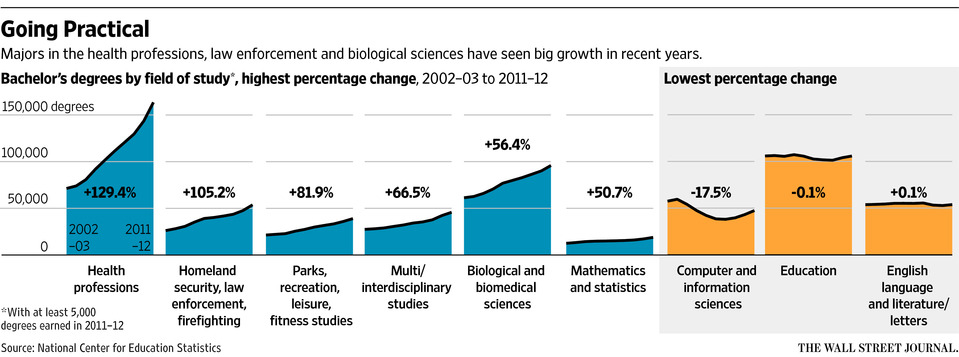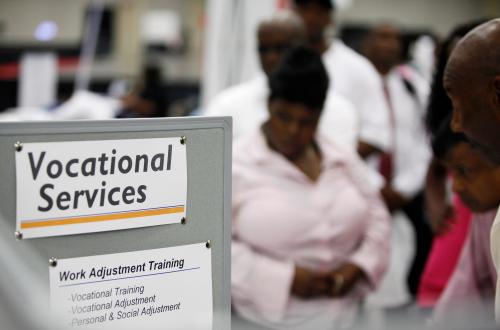College freshmen are feeling economic pressure to pick majors much earlier than was true in past years, The Wall Street Journal reported last week. Whether or not you think this is a good thing, this chart has important lessons for today’s students and their parents.
Two points stand out: The field with the largest jump in the academic years that began in 2002 and ended in 2012 was health professions, at 129%. The major on the chart with the greatest decline in that period was computer and information services, which fell more than 17%. Given what we have known for some time since the recession, do these trends make sense?
Students poured into health-related majors, probably thinking that the sector had secure jobs and paid well. Health-care spending as a share of GDP was climbing throughout this period, and it seemed a good bet that would continue.
But the health-care industry has been in turmoil in recent years. This is not primarily because of the Affordable Care Act but structural changes that have given way to an ascendance of “disruptive entrepreneurship,” as Jonathan Rauch of the Brookings Institution recently wrote. Disruption is good for consumers but unpleasant for many workers and firms. Pay and job security in health fields are not what they used to be, nor are they likely to be again. The rush for security reflected in those college-major statistics may not deliver what at least some of those graduates were probably expecting.
Contrast this with the drop in information science majors. What a mistake many students made by not going into computer-related fields, which have been a hotbed of activity the past decade.
In particular, given the demand for software coders, especially among start-ups, is it any wonder that coding academies–short-term, post-college, or mid-career courses–are popping up around the country? There may be quality issues with some of these boot camps, but the fact that they are attracting many entrants suggests intense demand among employers.
The drop in computer and information science majors from 2002 to 2012–which conceals a pickup in the number of majors since the middle years of that decade–also helps explain the strong interest among many large U.S. employers for foreign programmers under the temporary H-1B visa program, and support for immigration reforms that would allow more H-1B workers. (Given immigrants’ strong track record of launching new firms, the U.S. is likely to be better off with more permanent technically trained workers.)
The bottom line? Today’s students should be wary of picking majors only because they seem to promise a secure life. Instead, pick a major because of personal interest, because it equips people to handle and adapt to inevitable disruptions in the labor market, and because it prepares them for creating jobs (for themselves and others) by founding a firm. A good grounding in computer coding, whether as a major or a minor, is likely to be an essential tool in this century. Don’t be fooled by that drop in computer-related majors from 2002 to 2012.


Commentary
Op-edA lesson from the decline in computer-related majors
March 23, 2015